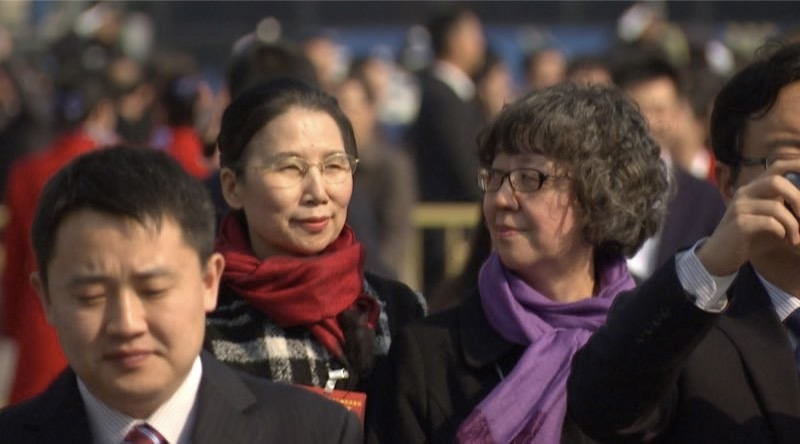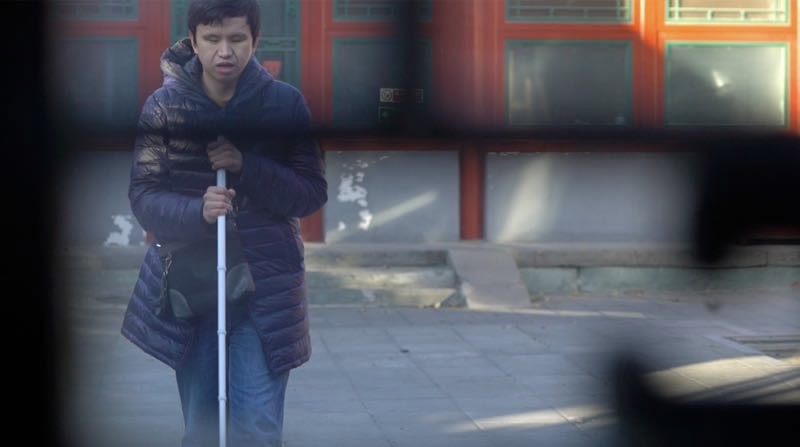
Politics
23:06, 02-Mar-2018
I HAVE A QUESTION: Equal access for people with disabilities
By Han Bin, Wei Lynn, Yuying

CAN I MAKE A DIFFERENCE?
We are not defined by our abilities or disabilities, but by our choices.
Professor Yang Jia – the only visually impaired member of the Chinese People’s Political Consultative Conference (CPPCC) National Committee – embodies this saying so well.
“I think losing my sight has actually made me more determined to perceive what I want to do,” she tells CGTN correspondent Han Bin.
Known for her positive disposition, the 55-year old has not lost sight of this spirit, despite having battled being blind for over two decades now. Her optimism, according to her, partially stems from her being a member of the committee, citing it as a great platform for members to achieve their goals, and hers – towards a just society.
Yang believes she can make a difference in her capacity as a CPPCC member, being the only visually impaired member of the committee in history. She has submitted over 60 proposals in her past two terms as a political adviser, two of which have been implemented: pedestrian tracks for the blind and subtitles for CCTV’s Spring Festival shows.
Note that CPPCC members are not compensated for their contributions to the committee; rather, they do it voluntarily and in addition to their daily jobs.
REALISTIC AND FEASIBLE PROPOSALS
Some quarters have questioned the real function of the 2,158-member strong CPPCC, citing, among other aspects, that it is a club for the "rich and famous," with criticisms on quality of proposals put forth.
Yang, who is now into her third term as a CPPCC member, says she has learned to come up with more effective proposals over the years. “We need to make more realistic proposals and feasible solutions,” she says.

Professor Yang Jia on her way to the Great Hall of the People /CGTN Photo
Professor Yang Jia on her way to the Great Hall of the People /CGTN Photo
That – and to be more down to earth, as well as to look at things from both a macro and micro standpoint.
Ultimately, to measure how advanced a society is, Yang says to look at just two things: How does a society look at a person with disabilities, and how people with disabilities look at themselves.
NO-BARRIER CINEMAS IN CHINA
And herein lays her proposal for this year’s committee meeting, going back to basics: Yang wants to make cinemas accessible for the visually impaired.
To be sure, this concept isn’t completely new as the Xin Mu Theater in Beijing has been screening films for the visually impaired since 2005, where volunteers help interpret and narrate the movie.
But Yang deems this as not a true "inclusion," a notion she has been fighting for over the past decade. By “accessible” in her proposal, she means this disabled group is able to go to the movies – in shopping malls – just like anyone else.
“The cinemas can have a special space [such as a] booth for the visually impaired. When we watch the film, we can still hear both the background and description of the film. It’s achievable with today’s technology,” she says, noting that such a proposal has reportedly been executed in places in the United States, Europe and certain parts of Asia.
Zhang Gaoli, a fellow visually impaired citizen, calls for the same cause – to be able to watch the latest films in movie theaters.
“We are no different than anyone else. We have our own lives, except that we are visually impaired,” Zhang says.

Zhang Gaoli on his way to catch a movie at Xin Mu Theater /CGTN Photo
Zhang Gaoli on his way to catch a movie at Xin Mu Theater /CGTN Photo
Professor Yang is hopeful and optimistic in pushing forward her proposal, and for this goal to be realized in the next five years.
“For the visually impaired, we can walk and talk, but we want to laugh and cry just as everyone else in the cinema. That’s true participation, from a cultural perspective,” she says.
“People are social animals. We enjoy going to the movies. It’s the sense of atmosphere. When we go to the movies, we get a glimpse of the real world,” adds Yang, who is a fan of the movies herself.
And her one barometer to know how advanced China is and will be? “Just by looking at this one aspect of accessible films,” she answers with a smile.
(Yang is a Professor at the Graduate University of the Chinese Academy of Sciences, and also the Vice Chairman of the United Nations Committee on the Rights of Persons with Disabilities.)

SITEMAP
Copyright © 2018 CGTN. Beijing ICP prepared NO.16065310-3
Copyright © 2018 CGTN. Beijing ICP prepared NO.16065310-3